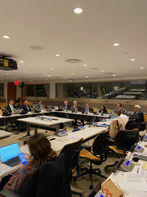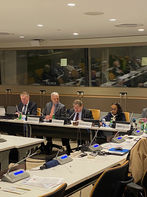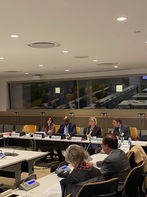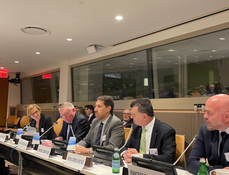XXIII INFOPOVERTY WORLD CONFERENCE
"A.I. turmoils digital processes: how to act to ensure human rights
and provide e-welfare for all?"
April 12, 2024
UNHQ (CR 11) - New York
online on UN Webcast.
REWATCH THE CONFERENCE

Rewatch the full Conference on UNWEBCAST
Rewatch each statement on YouTube
Clik on the session to open the playlist
IWC23 ON THE NEWS
9th April 2024
Università degli Studi dell'Insubria
COMMUNICATION PORTFOLIO
SESSIONS OF THE CONFERENCE
EWABELT
PANEL
PRESS
RELEASE
SPEAKERS'
BIOs
OPENING SESSION
Institutional Greetings
SPEAKERS
H. E. MARCO ROMITI, Minister Counsellor, Permanent Mission of Italy to the United Nations
H.E. ALBERTO BARACHINI, Undersecretary of State, Presidency of the Council of Ministers, Italy
NAVID HANIF, Assistant Secretary-General, UN Economic Development in the Department of Economic and Social Affairs (UN DESA), Pakistan
ERNESTO OTTONE R., Assistant Director-General Culture Sector, UNESCO, France
General Introduction
PIERPAOLO SAPORITO, President, OCCAM and Infopoverty Program, Italy
FIRST SESSION
How could a holistic approach based on AI be functional to SDGs achievement?
ABOUT THE SESSION
AI presents both risks and opportunities for human well-being. While it holds promise for societal progress and poverty alleviation, its predominant use in warfare and surveillance poses concerns. To prevent past catastrophic outcomes, AI-powered technologies should pivot toward socially beneficial applications, addressing global societal needs, especially for marginalized communities. Ethical testing and application are pivotal for ICTs and AI to effectively address contemporary challenges and meet fundamental human needs. Stakeholders and scientists’ collaboration with governmental representatives is crucial to integrate these tools into global policies, aiming for universal e-welfare.
SPEAKERS
Chair: PATRIZIO CIVILI, Special Advisor to the Director General, IDLO; Former UN Assistant Secretary General, Italy
BELINDA BISCOE, Senior Associate Vice President, The University of Oklahoma, USA
NICCOLÒ RINALDI, Head of Unit Asia, Australia and New Zealand, European Parliament, Italy
HOSSAM BADRAWI, Chairman, Nile Badrawi Foundation for Education & Development, Egypt
REMY SIETCHIPING, Chief, Policy, Legislation and Governance Section, UN-Habitat, Kenya
LIBERATO BAUTISTA, President, CoNGO, the Conference of Non-Governmental Organizations, The Philippines
SECOND SESSION
Poverty eradication and hunger: a first challenging priority for AI
SPEAKERS
Chair: MELCHIADE BUKURU, Former Director, UNCCD Liaison Office in New York
GUANGZHOU QU, Director, FAO Liaison Office in New York, USA
GIOVANNA SEDDAIU, Professor in Agronomics and EWA-BELT Project Coordinator, Università di Sassari, Desertification Research Centre, Italy
YOUSSEF BRAHIMI, Member of the EWABELT Scientific Advisory Board, Founding member, Sahara and Sahel Observatory (OSS), France
FRANÇOIS TAPSOBA, Member of the EWABELT Scientific Advisory Board, Burkina Faso
PlantHead Platform in action from villages in Kenya
operated by OCCAM (Giovanni Zanoni & Martina Baldessin), Italy
Lab testing of qPCR device for DNA detection
by STMicroelectronics (Marco Cereda, Researcher) with University of Sassari (Quirico Migheli, Director NRD) and University of Nairobi (Abigael Ouko, Lecturer)
Focus on biopesticides: Cassia Nigricans study case in Burkina Faso
NICOLA MORGANTI, President, ACRA Foundation, Italy
Neglected Underutilized Crop Species (NUS): the case of Fonio value chain in Ghana
JOHN BIDZAKIN, Research Fellow, Cranfield University, UK
ABOUT THE SESSION
With poverty levels expanding across the globe, raising concerns about a potential recurrence of the 1929 crisis – stemmed from oversaturated production and a shortage of buyers – must be addressed. It thus becomes imperative to craft comprehensive policies aimed at fostering development among the most impoverished populations. The Conference's historical mission lies in highlighting exemplary practices, such as the EU H2020 EWABELT Project (GA 862848), executed across villages in 30 sub-Saharan regions by 20 partners among universities, research centers and Businesses, showcases how the integration of AI-empowered digital technologies into agriculture fosters tangible development within Africa's most underserved communities. This approach mirrors the successful model of ICT Villages, endorsed by the WSIS since 2005, concurrently addressing the migration phenomenon.
THIRD SESSION
Good health and well-being (SDG3) – what role could AI play in telemedicine practices?
ABOUT THE SESSION
Telemedicine's progress plays a crucial part in improving healthcare access. By setting up strong new practices and enhancing digital healthcare platforms, a great mass of people living in underserved regions can be assisted. At the same time, governmental efforts are due to build efficient e-health systems for all, integrating existing hospitals with territorial points of care. Global health system in crisis: the role of telemedicine in assuring basic services to all.
SPEAKERS
Chair: CLAUDIO AZZOLINI MD, Founder of Eumeda Telemedicine Platform, AS, Insubria University, Varese-Como, Italy
FRANCESCO OGGIONNI ITS, Advisory Board Member, CDAOS.cat non-profit Data & Digital Health Innovation, Barcelona, Spain
SIMONE DONATI MD, Associate Professor, Department of Medicine and Surgery, Insubria University, Varese-Como, Italy
ANDREA FALCO PEng, Alfa Design Studio, Italy
ANTONIO CAPONE JR MD FACS, Associated Retinal Consultants, Royal Michigan, USA
CLAUDE BOSCHER MD, Former Surgeon of the Pôle Tête et Cou, Hôpital Américain de Paris, Neuilly sur Seine, France
ANAT LOEWENSTEIN MD, MHA, Professor and Director, Division of Ophthalmology, Tel Aviv University, Israel
UMBERTO PAOLUCCI MEng, Up Invest Srl; Former President, Microsoft Middle East and Africa, Milan, Italy
FOURTH SESSION
Urban-Rural linkages to promote sustainable development and clean energy of urban and rural communities
SPEAKERS
Chair: ALIYE P. CELIK, Chair of the Board, Consortium for Sustainable Urbanization
(CSU), USA
LANCE JAY BROWN, Founder, Consortium for Sustainable Urbanization (CSU), USA
FRANCESCA DE FERRARI, Programme Management Officer, UN-HABITAT New York,
USA
The Hydrogen Revolution in Housing
ANDREA ALESSANDRO GIACOMINI, CEO & Head of Public Affairs, Giacomini Spa,
Italy
MARIAMA SAMAKE, Communication & Institutional Relations, Giacomini Spa, Italy
GUIDO GALLIANI, Technical Development with R&D Giacomini, Italy
EMMANUEL AMOS, Founder, Programos Foundation, Nigeria
UN Millennium Village of Sambaina, Madagascar
RAKOTONIRINA TAHIRY THIERRY, Chief Sambaina School District, Madagascar
ABOUT THE SESSION
The reciprocal and repetitive flow of people, goods, finances, and environmental services between rural, peri-urban, and urban areas creates interdependence as well as imbalances. Urban areas gather resources and people, while rural villages often suffer from climate vulnerabilities and outdated technologies. The Digital Revolution provides guidelines for implementing clean energy solutions to preserve the environment with cohesive development policies across national, regional, and local levels to address these disparities and foster successful, uniform progress.
FIFTH SESSION
Using Balanced Human and Artificial Intelligence Strategies to bridge the existing gaps: education, gender equality and poverty eradication to guarantee human rights
ABOUT THE SESSION
Human and social development relies on the assurance of human rights, including education and the promotion of gender equality, them serving as catalysts for progress in all spheres. In this context, AI and digital technologies hold significant potential to contribute to bridging the existing gaps. Learning from the protagonists of change could highlight new paths and guidelines to be adopted.
SPEAKERS
Chair: PETER A. PSARAS, Founder Chios Capital, Chief Strategy Officer & Managing
Director Global Futures Group LLC, Advisory Council International Science Reserve ISR,
New York Academy of Sciences NYAS, USA
HON. JERRY M. HULTIN, Former Under Secretary of Navy, President Emeritus New
York University Tandon School of Engineering, USA
BELINDA BISCOE, Senior Associate Vice President, The University of Oklahoma, USA
JEFFRY WILLIAMS, Founder & CEO, Worldwide Tech Connections, USA
ESTHER WOJCICKI, Founder, Global Moonshots in Education, Founder Palo Alto High
Media Arts Program, CEO Woj.Education, USA
NADAIT GEBREMEDHEN MD, Founder & Executive Director, Hagush, USA
KIYOSHI NAKANISHI, CEO, Homeost Corporation, Japan
SIMON DOWNES, FDA correspondent
LUIS HERNANDEZ, International Attorney, Regulatory Affairs Specialist
SIXTH SESSION
Creative feedback on AI innovative solutions for the Plan of Action 2024-2027
SPEAKERS
Chair: PIERPAOLO SAPORITO, President, OCCAM and Infopoverty Programme
JOHN STEFFENS, Assistant Vice President Emeritus, University of Oklahoma, USA
DAVID NEELY, President and CEO, Affecting Change International (ACI), USA
GIACOMO MAZZONE, Secretary-General, EUROVISIONI, Member, CICT-ICFT, Italy
ALDO TORREGIANI, High-Level Advisor for Sustainable Policies, Italy
Poetry on AI
IMTIAZ DHARKER, Poet, Chancellor, Newcastle University, UK
ABOUT THE SESSION
With AI, all the various factors of change will converge in a holistic system capable of overcoming the sectorization of science through an epistemological approach; clean energy, climate change, waste management, circular economy, wide connective, new algorithms inspired by Pi, are all instances that could bring a harmonious connubium of creativities, traditional knowledge and cutting-edge technologies to face crises of war and poverty, emphasizing the responsibility of each single person involved.
SPECIAL EVENTS
New AI approach to mental health and substance abuse
by the Christopher Smithers Foundation, USA
NIKKI SMITHERS, President, The Christopher Smithers’ Foundation
BRINKLEY SMITHERS, Vice-President, The Christopher Smithers’ Foundation
NICHOLAS SMITHERS, Director, The Christopher Smithers’ Foundation
CHRISTOPHER SMITHERS, Secretary, The Christopher Smithers’ Foundation
































































